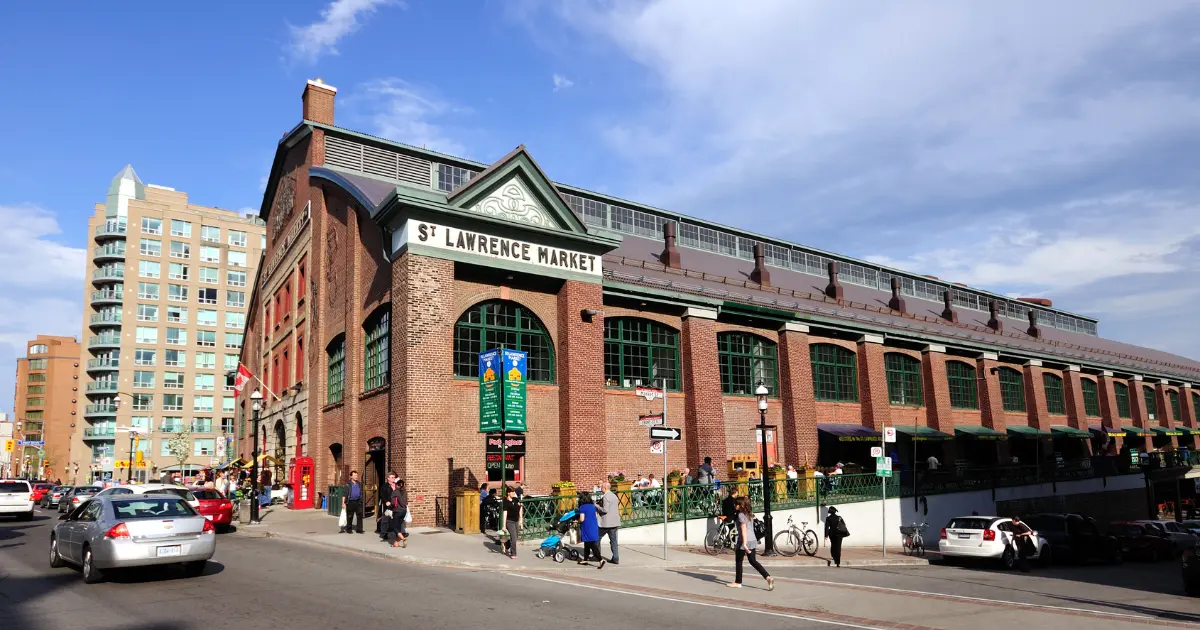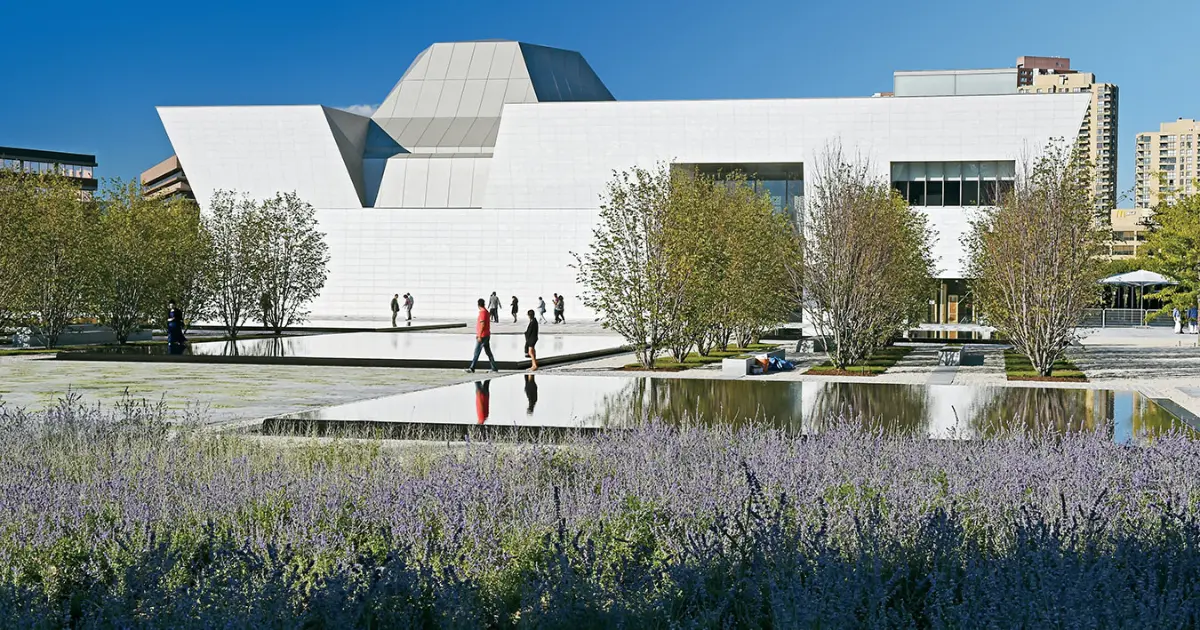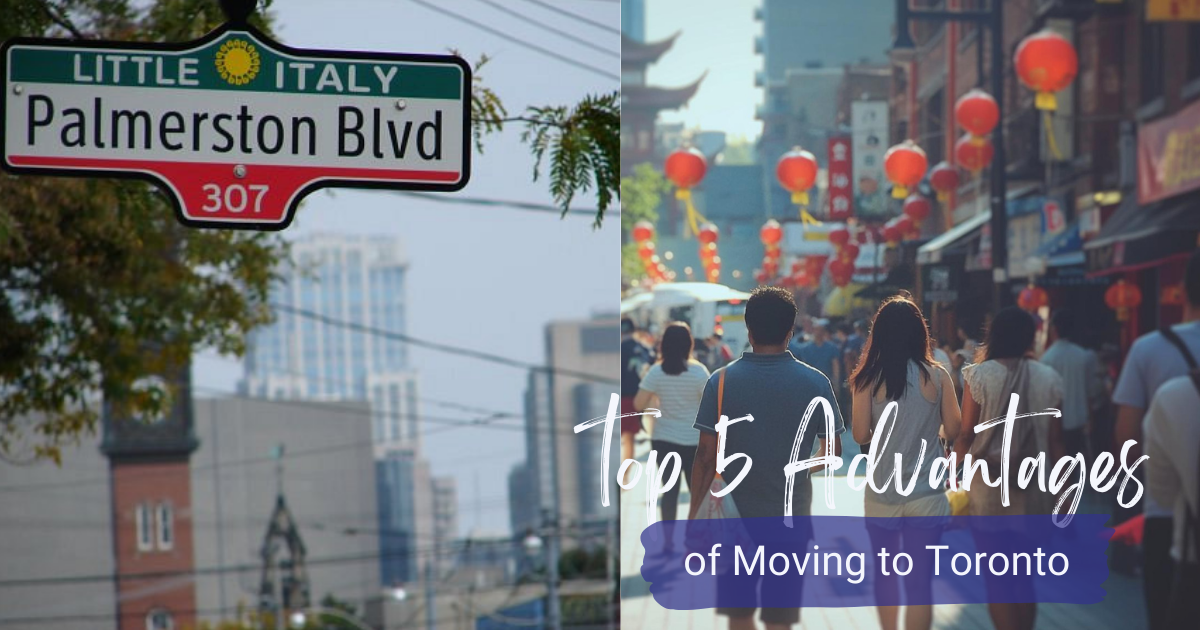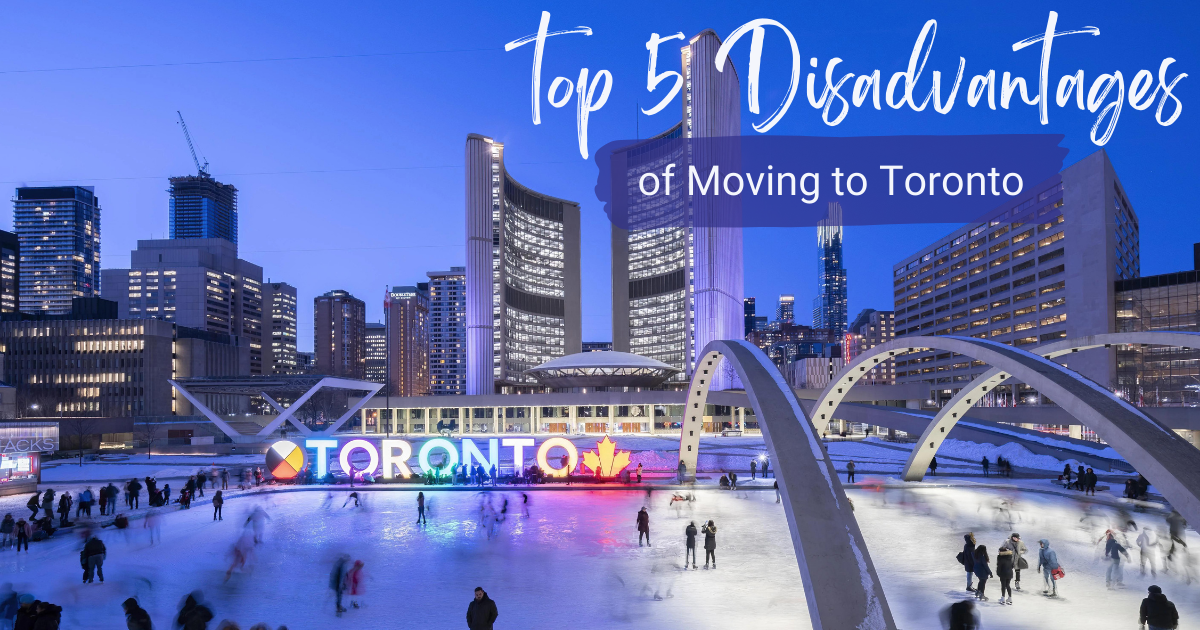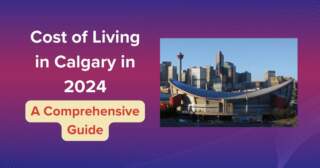Are you relocating to Toronto, Ontario?
Whether you’re an international student, a family, or simply planning to relocate, it’s essential to weigh the advantages and disadvantages of living in a vibrant, trendy, and populated city.
In this article, we will not only cover the pros and cons of moving to Toronto, but we will also explore some of the main reasons people even consider moving to “The 6” in the first place, including diversity, healthcare, and jobs.
What is Toronto known for?
For decades, Toronto has been a top choice for newcomers to Canada. It’s renowned as one of the most culturally diverse cities globally, offering a rich tapestry of cuisines, languages, and traditions.
Here are a few things Toronto is known for:
Cultural Diversity:
Toronto is rich in multiculturalism, with the city regularly welcoming new residents from around the globe. This diversity is evident in the city’s food scene, festivals, and cultural events.
Residents and visitors are spoiled for food, shopping and entertainment choices in neighbourhoods like Chinatown, Greektown, Little Italy, Koreatown and Indian Bazaar (just to name a few) that dot the landscape.
These neighbourhoods represent just a few examples of the diverse range of communities that make up the fabric of Toronto.
Whether you’re looking for urban sophistication, cultural diversity, or a laid-back beach lifestyle, Toronto has a neighbourhood to suit every taste and lifestyle preference.
Canada’s Economic Hub:
Toronto’s diverse economy, strategic location, innovation ecosystem, educated workforce, and vibrant culture make it a thriving economic hub with opportunities for business growth, investment, and prosperity in the following sectors, just to name a few.
- Financial Services: Toronto is home to the Toronto Stock Exchange (TSX) and Canada’s largest financial district, often called Bay Street, which houses top banks, investment firms, and financial institutions.
- Business and Commerce: The city is a hub for business and commerce, attracting companies from various industries, including technology, telecommunications, media, healthcare, and manufacturing.
- International Trade: Toronto’s strategic location in North America and proximity to major transportation networks, including air, rail, and shipping routes, make it a key player in international trade.
- Innovation and Technology: Toronto is a global leader in innovation and technology, with a robust startup ecosystem and world-class research institutions. The city’s innovation hubs, such as the MaRS Discovery District and the Toronto-Waterloo Region tech corridor, foster collaboration and entrepreneurship, driving economic growth and attracting investment.
- Education and Talent Pool: Toronto and the Greater Toronto Area are home to prestigious universities and colleges, including the University of Toronto, Toronto Metropolitan University, Ontario College of the Arts, and York University, each consistently producing a highly skilled and educated workforce.
- Real Estate and Development: Toronto’s real estate market is one of the most dynamic and robust in North America, with ongoing development projects and a growing population driving demand for residential, commercial, and mixed-use properties. Thanks to high demand, the construction sector is a significant job creator.
All Four Seasons:
Toronto and the surrounding region experience the fullness of all four seasons, including a wide range of temperatures, weather conditions, stunning foliage and flowers, and magical snowfalls.
- Summer: June to August, Toronto experiences warm to hot weather with temperatures ranging from 20°C to 30°C (68°F to 86°F) on average, plus high humidity.
- Fall (Autumn): September to November brings cooler temperatures of 10°C to 20°C (50°F to 68°F) and vibrant foliage as the city transitions from summer to winter.
- Winter: December to February sees average temperatures of -1 °C to -6 °C (30°F to 21°F), although temperatures can drop below freezing, especially at night.
- Spring: March to May do bring rain, but the longer daylight hours and warmer temperatures, ranging from 5°C to 15°C (41°F to 59°F), mean more sunny days outdoors to come.
Best Places to Visit in Toronto, Ontario:
Toronto has endless outdoor adventures and outings for family members of all ages.
-
Kensington Market:
One of Toronto’s most vibrant, multicultural neighbourhoods with eclectic shops, cafes, bars and street art, Kensington has been considered a hidden gem of Toronto for a long time.
Toronto’s small island cluster is just a short ferry ride away, offering a quaint and peaceful retreat from the city, full of beaches, parks, picnic areas, and a small amusement park. With no cars on the island, it’s a perfect spot to bring your bike.
A sprawling urban park featuring hiking trails, gardens, a zoo, and a large pond provides a serene escape within the city limits.
The historic Distillery District area and its cobblestone streets are home to art galleries, boutiques, fine restaurants, an incredible Christmas Market and walking ghost tours.
Brick Works is a former industrial site transformed into a sustainable community space with gardens, markets, and hiking trails, providing educational programs and outdoor activities for all ages.
Toronto’s historic market (circa 1803) near Union Station features fresh produce, gourmet foods, artisanal goods, endless ready-to-eat culinary delights, and Carousel Bakery’s famous “pemeal bacon on a bun” sandwich.
-
The Danforth (Greektown)
This Greek-heritage neighbourhood has restaurants, cafes, bars, music venues and shops, hosting cultural events and festivals throughout the year. It’s a beautiful place to walk, shop, and people-watch.
The Bluffs are a scenic natural along Lake Ontario’s shoreline, offering panoramic views, hiking trails, and beaches, ideal for outdoor enthusiasts and nature lovers.
A cultural institution showcasing Islamic art, artifacts, and exhibitions, fostering cross-cultural dialogue and understanding through education and arts programming.
Advantages and Disadvantages of Moving to Toronto, Ontario
Before moving to Toronto, it’s essential to consider the pros and cons to manage your expectations of your new home. Whether you are moving by choice or necessity, you will likely find some aspects of Toronto that you’ll love and some that are unfavourable.
| Advantages | Disadvantages |
|---|---|
| 1. Vibrant and omnipresent cultural scene | 1. High cost of living |
| 2. Diverse job opportunities | 2. Traffic congestion |
| 3. Excellent healthcare system | 3. Harsh winters |
| 4. World-class education institutions | 4. Limited housing availability |
| 5. Access to beautiful natural landscapes | 5. Income disparity |
5 Advantages of Moving to Toronto, Ontario
Toronto offers numerous benefits for residents:
-
A Vibrant and Omnipresent Cultural Scene:
Toronto is a vibrant melting pot of cultures with diverse ethnicities and communities.
Thanks to this, the city hosts numerous art, music, food festivals, and brick-and-mortar attractions like museums and theatres that draw visitors worldwide, generate revenue and support local businesses, ultimately contributing to its economic vitality.
Some of the prominent cultures in Toronto include:
- Chinese Culture: Toronto’s Chinatown is one of the largest in North America, offering a glimpse into Chinese traditions, cuisine, and festivals.
- Italian Culture: The city boasts a rich Italian heritage, with vibrant communities in areas like Little Italy and Corso Italia, where you can find authentic Italian restaurants, cafes, and cultural events.
- South Asian Culture: Toronto has a significant South Asian population, including people from India, Pakistan, Bangladesh, and Sri Lanka. This is reflected in the many Indian restaurants, clothing stores, and cultural celebrations.
- Caribbean Culture: The Caribbean community in Toronto adds a lively and colourful flavour to the city, with events like the annual Caribana festival celebrating Caribbean music, dance, and food.
- Indigenous Culture: Toronto sits on the traditional territory of several Indigenous nations, and the city recognizes and celebrates Indigenous cultures through events, art, and education.
- Portuguese Culture: Toronto’s Little Portugal is a hub of Portuguese culture, offering authentic cuisine, bakeries, and cultural events that highlight Portugal’s traditions.
- Filipino Culture: The Filipino community in Toronto is one of the largest in Canada, with festivals, restaurants, and cultural centers showcasing Filipino cuisine, dance, and art.
- Middle Eastern Culture: Areas like Little Syria and Lawrence Heights have strong Middle Eastern communities, offering delicious food, hookah lounges, and cultural events.
- Jewish Culture: Toronto has a thriving Jewish community, with synagogues, kosher restaurants, and cultural organizations that celebrate Jewish traditions and heritage.
- African Culture: The African community in Toronto is diverse, with people from various African countries bringing their traditions, music, and cuisine to the city.
These are just a few examples of the rich tapestry of cultures that make Toronto such a vibrant and multicultural city.
-
Diverse Job Opportunities:
Toronto’s robust economy provides various job prospects in numerous industries, making it an attractive destination for career advancement.
The city’s finance sector is prominent, with banking, investments, and insurance opportunities. The technology sector is rapidly growing, with jobs in software development, IT, and fintech. Healthcare provides roles in hospitals, research, and pharmaceuticals. Creative industries like film, media, marketing and advertising also thrive in Toronto. Additionally, there are opportunities in education, tourism, manufacturing, and green energy sectors.
-
Excellent Healthcare System:
Like all of Ontario, Toronto offers access to world-class healthcare facilities and services, ensuring families can access quality medical care from highly skilled healthcare professionals. Toronto’s healthcare system is known for its innovation, patient-centred care, and commitment to excellence, making it a hub for medical advancements and top-tier healthcare services.
Hospitals like Toronto General Hospital, Sunnybrook Health Sciences Centre, and Mount Sinai Hospital are known internationally for their advanced treatments and research in cardiology, oncology, and neurology.
Clinics like the Toronto Western Hospital and Princess Margaret Cancer Centre offer specialized care, while services like the Hospital for Sick Children cater to pediatric needs.
-
World-Class Education Institutions:
Toronto boasts diverse educational opportunities, including top-ranked public and private schools, specialized programs for diverse interests and learning styles, and extracurricular activities. The city also has prestigious universities and colleges offering quality education and research opportunities.
In addition to the University of Toronto, Ontario College of the Arts, and York University, Toronto boasts several other world-class educational institutions.
These include Toronto Metropolitan University (formerly Ryerson University), known for its innovation and entrepreneurship programs.
George Brown College offers a wide range of career-focused programs. Seneca College provides hands-on learning in various fields. Centennial College has a diversity of programs and industry partnerships.
-
Access to Beautiful Natural Landscapes:
Despite being a bustling metropolis, Toronto boasts stunning natural landscapes, including waterfront trails, parks, and conservation areas.
The city’s extensive network of parks and playgrounds in places like North York, Etobicoke, and Scarborough provides ample space for children to stay active and engaged throughout the year.
Additionally, these neighbourhoods often host family-oriented events and activities, fostering a strong sense of community among residents.
5 Disadvantages of Moving to Toronto, Ontario
Consider these drawbacks before making your move:
-
High Cost of Living:
Toronto’s housing market and overall cost of living can be challenging for many residents, especially those on a tight budget.
Housing and transportation stand out as two significant contributors to its high expenses.
Housing Costs: The city has experienced rapid real estate price growth, population growth, limited land availability for development, and foreign investment.
Buying or renting a home in Toronto can be expensive, especially in desirable neighbourhoods close to the downtown core or with good access to public amenities and transportation.
The average rent for a 1-bedroom costs approximately $2,145 per month.
Transportation Expenses: While the city has an extensive public transit system, including buses, streetcars, and subways operated by the Toronto Transit Commission (TTC), public transportation costs can add up, especially for daily commuters (at least $143-188 per month for adult daily commuters).
Additionally, car ownership in Toronto includes insurance, maintenance, parking fees, and fuel costs.
-
Traffic Congestion:
Like any major city, Toronto experiences traffic congestion, particularly during rush hours, affecting commuting times.
That said, public transportation on the TTC (subways, buses and light rail) and the GO train (intercity transit) can help commuters make better transportation choices when high congestion or weather makes driving too challenging.
-
Harsh Winters:
Toronto winters can make days unpredictable due to low temperatures, snow and ice, challenging driving conditions, and the effects of the weather on services like public transportation and electricity.
These conditions are trending toward being warmer than winters in Toronto’s past, and the city has many ways to accommodate and adjust for inclement weather.
-
Limited Housing Availability:
The demand for housing in Toronto often outstrips supply, leading to limited options and high rental prices.
As this has been an ongoing trend, the province has been encouraging development in Toronto’s nearby (and lovely) suburbs, allowing residents to live comfortably close to the big city.
-
Income Disparity:
While Toronto offers lucrative job opportunities, income disparity between high and low earners can be significant.
Planning Your Move to Toronto, Ontario?
If you’re planning a move to Toronto, consider enlisting the help of a local moving company to streamline the process.
Professional movers in Toronto can handle everything from packing and transportation to furniture assembly, ensuring a smooth transition to your new home.
Conclusion
As you can see, Toronto is a dynamic and diverse city with something to offer for everyone.
While it has its challenges, the benefits of living in Toronto often outweigh the drawbacks.
Whether for its cultural vibrancy, economic opportunities, or natural beauty, Toronto has plenty to explore and discover.
Quick FAQs About Moving to Toronto:
Is Toronto an expensive city to live in?
Yes, Toronto is widely regarded as one of the more expensive cities to live in, not just in Canada but globally.
What is the job market like in Toronto?
The job market in Toronto is diverse, competitive, and robust, spanning industries like finance, technology, healthcare, and education.
It offers ample opportunities for skilled professionals, entrepreneurs, and job seekers globally, contributing to the city’s dynamic and thriving economy.
What are the popular neighbourhoods in Toronto?
Toronto’s many neighbourhoods have their unique charm, amenities, and lifestyle. There is truly something for every lifestyle. Some of Toronto’s most popular and sought-after neighbourhoods include The Annex, Yorkville, Kensington Market, Leslieville, and The Beaches.
Navigating the immigration process to move to Toronto involves understanding visa requirements, applying for appropriate permits, and fulfilling legal obligations.
Applicants may need employment, study, or family sponsorship to obtain visas or permanent residency.
Consulting immigration experts or legal professionals can help streamline the process effectively.
How safe is Toronto?
Toronto is generally considered a safe city, with lower crime rates than other major urban centers. According to data from Money.ca, in 2024, Toronto is Canada’s number one safest city.
What are the transportation options in Toronto?
Toronto offers an extensive transportation network, including subway, buses, streetcars, and commuter trains. Additionally, there are cycling paths and ride-sharing services available.
The city’s public transit system, operated by the TTC, provides convenient access to various neighbourhoods and attractions, facilitating easy mobility for residents.
Is Toronto suitable for families?
Toronto is ideal for families, thanks to many amenities and resources conducive to raising children and fostering a sense of community.
Some factors making Toronto and its neighbourhoods incredibly family-friendly are education, safety, recreational activities, cultural diversity and world-class healthcare.
What is childcare like in Toronto?
Childcare options in Toronto vary, ranging from licensed daycare centers, home-based daycares, preschool programs, and nanny services.
The city also offers subsidized childcare for eligible families, although waitlists for these services can be lengthy. Parents can choose childcare arrangements that suit their needs and preferences.
What is the weather like in Toronto?
Toronto has four distinct seasons, each offering its unique climate and atmosphere. Overall, the regional environment offers a diverse range of weather conditions throughout the year, allowing residents and visitors to experience the beauty of each season. Toronto has something to offer everyone, regardless of the weather.






